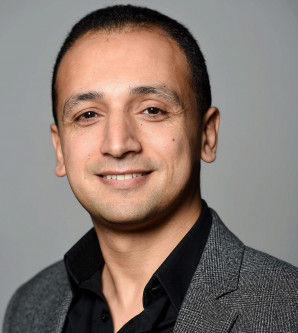Are people living with HIV at higher risk for long COVID—the condition in which symptoms of COVID-19 persist weeks or months longer than usual—if they have a “leaky gut”? In other words, if bacteria and bacterial products pass from their gut into the blood, which is a common source of chronic inflammation among people living with HIV?
This is a question Mohamed Abdel-Mohsen, PhD, assistant professor at The Wistar Institute Vaccine & Immunotherapy Center in Philadelphia, hopes to answer thanks to an $80,000 grant from The Campbell Foundation.

Mohamed Abdel-Mohsen, PhD, of The Wistar Institute’s Vaccine & Immunotherapy Center in PhiladelphiaCourtesy of The Campbell Foundation
“So far, there is no data indicating that people living with HIV/AIDS are more susceptible to COVID-19 infection,” Abdel-Mohsen said in a Campbell press release. “However, the preexisting state of ‘gut leakiness’ and chronic inflammation in this population raises the question of whether they may be more prone to long COVID.”
By studying the possible links between gut leakiness and long COVID among people living with HIV, researchers could better understand any existing risks and develop treatments and prevention tactics.
“Many members of our peer review board were intrigued by Dr. Abdel-Mohsen’s hypothesis calling it ‘novel’ and ‘unique,’” said Ken Rapkin, executive director of The Campbell Foundation, which is based in Fort Lauderdale. “Our foundation’s mission has always been to provide seed funding to alternative, nontraditional avenues of research that have direct clinical impact/relevancy to the HIV care/research community. This study dovetails precisely with our stated mission.”
It’s estimated that about 10% to 30% of people who survive a COVID-19 infection develop long COVID. However, researchers aren’t exactly sure what causes long COVID. Typical symptoms can include fatigue, brain fog, fevers, gastrointestinal problems, sleep disorders, depression and anxiety. What’s more, the symptoms can range in duration and severity.
Earlier this year, the National Institutes of Health launched an initiative to study the condition. And this month, in the wake of the COVID-19 Delta variant that’s spreading across the nation, expert virologists called for heightened precautions and better, more intense therapies for COVID-19 patients with weakened immune systems. For more on that, see “New Concerns About Coronavirus Evolution in Immunosuppressed Patients.”
Meanwhile, it has been known for over 100 years that people can become chronically ill after a viral infection. The experiences and wisdom of these people offer some insights on coping with long COVID.
HIV activist JD Davids is one such person. As he recently wrote in POZ, he lives with myalgic encephalomyelitis—“known as ME or ME/CFS and often called/minimized as chronic fatigue syndrome.” Noting the many parallels between long COVID and the HIV epidemic, Davids shared resources and tips for folks with long COVID (and their allies). For more, don’t miss his article “The HIV Movement Must Come Through.”
In related news, this is not the first Campbell grant Abdel-Mohsen has received. About two years ago, he received $100,000 to study whether altered sugar molecules could be used to fight inflammation in people living with HIV.
POZ also wrote about Abdel-Mohsen in 2020, when he and fellow HIV researchers from the BEAT-HIV Martin Delaney Collaboratory published recommendations for measuring the HIV reservoir in cure trials.







Comments
Comments